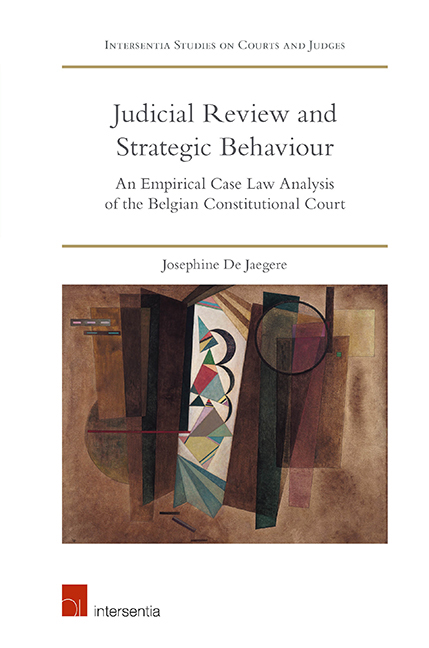 Judicial Review and Strategic Behaviour
Judicial Review and Strategic Behaviour Book contents
- Frontmatter
- Foreword
- Acknowledgements
- Contents
- Introduction
- PART I NORMATIVE FRAMEWORK: THE DELIBERATIVE PERFORMANCE OF CONSTITUTIONAL COURTS
- PART II THE CONTOURS OF JUDICIAL DECISION-MAKING
- PART III EMPIRICAL ANALYSIS OF THE BELGIAN CONSTITUTIONAL COURT'S CASE LAW
- Conclusion
- Codebook
- Bibliography
- Index
- About The Author
PART III - EMPIRICAL ANALYSIS OF THE BELGIAN CONSTITUTIONAL COURT'S CASE LAW
Published online by Cambridge University Press: 26 June 2019
- Frontmatter
- Foreword
- Acknowledgements
- Contents
- Introduction
- PART I NORMATIVE FRAMEWORK: THE DELIBERATIVE PERFORMANCE OF CONSTITUTIONAL COURTS
- PART II THE CONTOURS OF JUDICIAL DECISION-MAKING
- PART III EMPIRICAL ANALYSIS OF THE BELGIAN CONSTITUTIONAL COURT'S CASE LAW
- Conclusion
- Codebook
- Bibliography
- Index
- About The Author
Summary
While the previous part of the book concentrated on the potential relation between the deliberative expectations weighing on the Court and the behaviour it exhibits, this third part includes an extensive case law analysis aiming to explain the Court's behaviour. This analysis combines normative and empirical elements, an interdisciplinary approach that is often lacking in studies on judicial behaviour.
For this purpose, an extensive database on the case law of the BeCC has been produced, including all cases – annulment procedures as well as preliminary references – since its inception in 1985 until 2015 (n = 3145). A total of 55 variables were coded, which can be divided into four variable groups related to: (1) the key features of the procedure, (e.g. annulment/ preliminary procedure); (2) the participants involved (defending, initiating and intervening parties); (3) the Court's reasoning process (reference norms, citations, etc); and (4) case outcome. An overview of all variables can be found in the Annex to this book. In addition, data measuring the number of newspaper articles published on each case is relied upon, provided by the library and documentation office of the Belgian Constitutional Court for academic purposes.
In chapter 4, the salient cases will be identified within the Court's case law. It will be explained how the salience measures can be translated into explanatory variables, which will be integrated into the regression models in the following three chapters. Each of these chapters is centred on a particular judicial practice (case outcome, citation patterns, the proportionality analysis). In particular, in the chapter 5, it is argued that modulated outcomes may serve as a strategic compromise when a violation has been found but a ‘simple’ declaration of unconstitutionality would exceed the ‘tolerance interval’ acceptable to political actors. Although these outcomes are not necessarily more deferential towards legislative majorities, they do not confront the legislature in the same way as a declaration of unconstitutionality. However, the study of judicial behaviour should go beyond binary codings of case outcomes and look into the justificatory ground of constitutional rulings.
- Type
- Chapter
- Information
- Judicial Review and Strategic BehaviourAn Empirical Case Law Analysis of the Belgian Constitutional Court, pp. 125 - 126Publisher: IntersentiaPrint publication year: 2019
